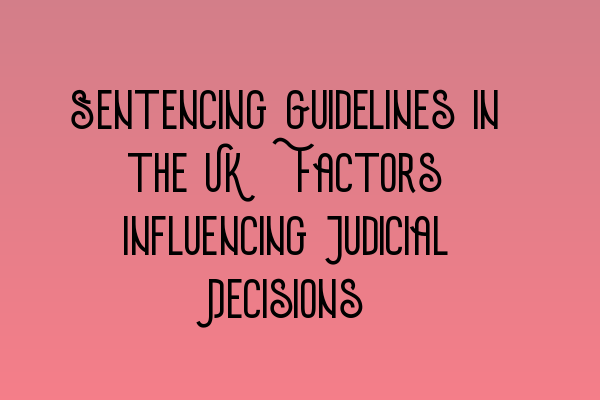Sentencing Guidelines in the UK: Factors Influencing Judicial Decisions
When it comes to criminal law in the UK, sentencing plays a crucial role in the justice system. Sentencing guidelines ensure that the punishment for a crime is fair and consistent. Understanding the factors that influence judicial decisions in sentencing is therefore of utmost importance. In this article, we will explore the key elements that judges consider when determining the appropriate sentence for an offender.
The Nature and Gravity of the Offense
One of the primary factors that influence sentencing decisions is the nature and gravity of the offense. This includes the severity of the crime, the harm caused to the victim, and any aggravating or mitigating factors that may be present. Judges assess factors such as intent, premeditation, and the level of harm inflicted to determine the appropriate level of punishment.
For instance, in cases of violent crime where intent and premeditation are proven, the sentencing may be more severe to reflect the seriousness of the offense. On the other hand, if mitigating factors such as a defendant’s remorse or cooperation are present, it may result in a lesser sentence.
Previous Convictions
Prior criminal history is another critical factor taken into account during sentencing. A person with a habitual criminal record is more likely to receive a harsher sentence compared to a first-time offender. Previous convictions demonstrate a pattern of behavior and can indicate a higher risk of reoffending. It is important to note that the relevance of previous convictions varies depending on the nature of the current offense.
If you want to prepare for the SQE 1 exam, we offer comprehensive SQE 1 Preparation Courses that will help you succeed. Practice mocks are also an essential tool for exam preparation. Take a look at our SQE 1 Practice Mocks FLK1 FLK2 to enhance your knowledge and boost your confidence.
Personal Circumstances and Mitigation
Another significant factor that influences sentencing decisions is the personal circumstances of the offender. These may include age, mental health issues, socioeconomic background, and any other factors that justify leniency or call for alternative measures. For instance, a young offender may be given a chance at rehabilitation rather than a harsh prison sentence.
Mitigating factors, such as genuine remorse, cooperation with the authorities, or efforts towards rehabilitation, can also impact sentencing decisions. Judges carefully consider these factors to determine an appropriate punishment that takes into account both punitive and reformative aspects.
Public Interest and Deterrence
The principle of public interest plays a pivotal role in sentencing decisions. The court considers the impact of the sentence on society and the need to protect the public. This includes deterring potential offenders from committing similar crimes and ensuring that the punishment reflects society’s expectations of justice.
Are you looking for SQE 2 preparation courses? At SQE Criminal Law & Practice Law UK, we offer comprehensive SQE 2 Preparation Courses that will equip you with the knowledge and skills required to pass the exam with flying colors.
Guidelines and Case Law
It is worth noting that judges rely on sentencing guidelines and case law to ensure consistency in their decisions. Sentencing guidelines provide a framework for judges to determine the appropriate range of sentences for specific offenses. These guidelines take into consideration the aggravating and mitigating factors relevant to each offense.
Furthermore, case law plays a crucial role in shaping sentencing decisions. Judges consider precedents set by higher courts to ensure a fair and proportionate sentence based on similar cases in the past.
If you are interested in knowing more about the upcoming SRA SQE Exam Dates, visit our article on SRA SQE Exam Dates.
In Conclusion
Factors influencing judicial decisions in sentencing are multi-faceted and require a comprehensive understanding of the law. From the nature and gravity of the offense to personal circumstances and the principles of public interest and deterrence, judges carefully consider a range of factors to reach a fair and proportionate sentence.
At SQE Criminal Law & Practice Law UK, we understand the importance of being prepared for the SQE 1 exam. Boost your confidence and knowledge by practicing with our SQE 1 Practice Exam Questions. Our expertly designed courses will guide you through the essentials of criminal law and prepare you for success.
